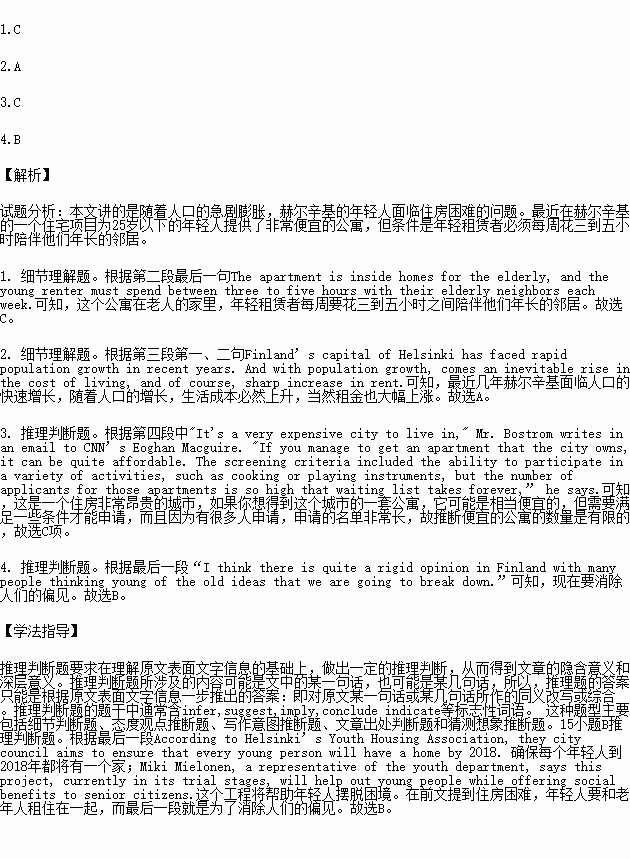题目内容
A recent housing project in Helsinki offers remarkably cheap apartments for those under the age of 25. They must commit to spending time with their older neighbors.
Helsinki offers 247-suqare-foot studio apartments with a bathroom, storage space, kitchen, and balcony for only $272 every month—about a third of the average price for a studio in the city. The apartment is inside homes for the elderly, and the young renter must spend between three to five hours with their elderly neighbors each week.
Like pretty much all other major cities in the world, Finland’s capital of Helsinki has faced rapid population growth in recent years. And with population growth, comes an inevitable rise in the cost of living, and of course, sharp increase in rent. Currently, Helsinki is ranked 14th on the list of the world’s most expensive cities. For those young and freshly independent, this causes terrible problems — even homelessness.
"It's a very expensive city to live in," Mr. Bostrom writes in an email to CNN’s Eoghan Macguire. "If you manage to get an apartment that the city owns, it can be quite affordable. The screening criteria included the ability to participate in a variety of activities, such as cooking or playing instruments, but the number of applicants for those apartments is so high that waiting list takes forever,” he says.
According to Helsinki’s Youth Housing Association, the city council aims to ensure that every young person will have a home by 2018. Miki Mielonen, a representative of the youth department, says this project, currently in its trial stages, will help out young people while offering social benefits to senior citizens. “I think there is quite a rigid opinion in Finland with many people thinking young of the old ideas that we are going to break down.”
1.Helsinki probably rents a cheap apartment to a young man who ________.
A. reaches the age of 25
B. has financial problems
C. promises to accompany the elderly
D. agrees to share it with his neighbor
2.Which is the root reason for the housing problems in Helsinki?
A. The population explosion.
B. The high living standard.
C. World’s priciest apartment rent.
D. Low employment of college graduates.
3.According to Mr Bostrom, the cheap apartments are ________.
A. well-decorated
B. difficult to afford
C. in short supply
D. popular with technicians
4.What can be inferred from the last paragraph?
A. The young in Helsinki are mostly homeless.
B. Helsinki will overcome people’s prejudice.
C. The project will be experimental in future.
D. The project is more beneficial to the young.
 亮点激活精编提优100分大试卷系列答案
亮点激活精编提优100分大试卷系列答案
